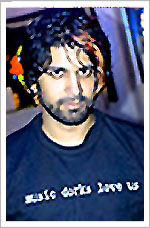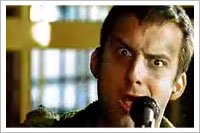By Don Jacobson
As regular readers of Chicago In Song know, my journey down the byways of the city’s references in popular music has borne some bitter fruit. Initially hoping there would be some kind of diversity in its portrayal, what I’ve discovered is that Chicago holds a fairly uniform place in the imaginations of the nation’s songwriters. The fact the city usually represents everything that’s wrong with the world hasn’t changed too much along the way; only the level of loathing seems to vary a bit from song to song, artist to artist, genre to genre.
As this exploration has shown, the city has been bashed in the blues, old-time country, ’60s classic rock, alternative and college rock, you name it. Now we can add bouncy post-punk to the list. And this time it’s personal because it’s coming from the locals. The Lawrence Arms cover the city and Lucky Boys Confusion take on the outlying areas.
Lucky Boys Confusion/Closer to Our Graves
Lucky Boys Confusion, they of the catchy “Hey Driver” video and one-time heavy Q101 airplay, doesn’t give a home team discount to the Chicago-hating. There’s a twist, however. These guys are from DuPage County, the same fertile musical ground that gave us one of Chicago’s most important rock bands: Material Issue. So that’s where their sights are mainly trained. And it’s probably not too surprising, because how could any sensitive and/or intelligent person grow up in DuPage and not harbor some issues?
In fact, the very title of this song, from Commitment (2003), their final LP for Elektra, seems to be a metaphor for DuPage County. In the context of the never-ending search for meaning and authenticity in life, they might be saying, aren’t you really pretty close to the death out there?
The world is blocked out in the bedroom
The radio won’t let her down
Every note is a reminder
Another failure born
Thirty miles outside Chicago
Kids know what’s really going on
Still this gravel highway makes a statement
We’re another town gone wrong
Moving out and moving on
You used to look like me
Moving out and moving on, forever
 Lyricist Kaustubh (Stubhy) Pandav here is drawing a picture of life in a “town gone wrong” some 30 miles from Chicago. That would pretty much describe a boatload of depressing suburbs. Young people are oppressed there: They know “what’s really going on,” but are powerless to stop or change it. I’m sure what he’s talking about here is all kinds of suburban uncoolness, such as Wendy’s and Hummers. And possibly the Metra crossings.
Lyricist Kaustubh (Stubhy) Pandav here is drawing a picture of life in a “town gone wrong” some 30 miles from Chicago. That would pretty much describe a boatload of depressing suburbs. Young people are oppressed there: They know “what’s really going on,” but are powerless to stop or change it. I’m sure what he’s talking about here is all kinds of suburban uncoolness, such as Wendy’s and Hummers. And possibly the Metra crossings.
In the chorus, Stubhy sings about the passage of time, and of how that can also bring you closer to the grave. So on the most obvious level that could be where the song’s title comes from – although I’m choosing to believe there could be something subliminal with my “suburbs equals death” theory. He speaks of “autumn,” when all the fun of summer withers, and of things slowly unwinding and slipping away. Later in the song, he’s apparently left behind DuPage and the girl he loved there, probably in a desperate attempt to escape the horrors of Naperville, and now is looking back on the experience:
It’s three months since I’ve seen Chicago
Now the buildings aren’t so tall
I found our initials in the pavement
Just another dream gone wrong
I bet it’s simpler today
Throwing everything away
But the memory remains, forever
The equation of Chicago with love lost or love gone wrong is also a songwriting staple that, I’ve found, began in the 19th Century and continues to this very day. I can’t say for sure, but I’m fairly convinced that New York and L.A. get more diverse treatment in song. Heartache seems an inescapable part of Chicago’s musical DNA.
The Lawrence Arms/Here Comes the Neighborhood
The way Chicago has been treated in song by out-of-towners, you’d think it would at least be able to catch a break from the natives, but it just ain’t so. No sooner does Stubhy get done crapping on the suburbs when here comes an urban punk rocker to do the same to Wicker Park.
 To be honest, though, Brendan Kelly of The Lawrence Arms is really my kind of guy. He writes smart and funny lyrics and his band’s breakneck style of punk musicianship is among the best I’ve heard in awhile. I certainly haven’t listened to every band on the Warped Tour, but to me this is among the more honest hardcore pop-punk I’ve come across. And not only is Kelly’s music great, he’s also a very outspoken dude who seems to say all the right things. For instance, he decried the commercialization of the Warped Tour because its overwhelming success was hurting small clubs by draining all the punk talent – my guess is he’s probably referring to the Fireside Bowl on Milwaukee Avenue, which, after 10 years of nurturing the city’s punk scene, dropped live music a few years ago. Then he got kicked off the Warped Tour for complaining that fans were being overcharged for bottled water – which they were.
To be honest, though, Brendan Kelly of The Lawrence Arms is really my kind of guy. He writes smart and funny lyrics and his band’s breakneck style of punk musicianship is among the best I’ve heard in awhile. I certainly haven’t listened to every band on the Warped Tour, but to me this is among the more honest hardcore pop-punk I’ve come across. And not only is Kelly’s music great, he’s also a very outspoken dude who seems to say all the right things. For instance, he decried the commercialization of the Warped Tour because its overwhelming success was hurting small clubs by draining all the punk talent – my guess is he’s probably referring to the Fireside Bowl on Milwaukee Avenue, which, after 10 years of nurturing the city’s punk scene, dropped live music a few years ago. Then he got kicked off the Warped Tour for complaining that fans were being overcharged for bottled water – which they were.
Kelly also famously feuded in 2000 with ex-Misfits singer Michale Graves, who runs Conservativepunk.com, a right-wing website featuring tributes to Milton Friedman and laments about the White House not being conservative enough. Graves called Kelly’s lyrics dangerous and radical – in other words, punk. (The spat eventually made it to The Daily Show.)
The way Kelly takes a bile-drenched knife to Wicker Park’s poseur culture, I can see why he might engender some heated opinions. It doesn’t spare any feelings, that’s for sure. But in the great tradition of confrontational art, the reason it hurts is because, underneath it all, you know it’s right. He’s holding a mirror up to all the ignoble impulses that lie at the heart of Chicago’s urban hipoisie. Talk about biting the hand feeds you. That’s very punk.
So, without further ado, The Lawrence Arms’ “Here Comes the Neighborhood.”
Work on Belmont, but I live in Wicker Park
All my friends are bartenders in all the coolest bars
My girlfriend’s in the coolest band that you’ve ever seen
They play the Empty Bottle every week
I’ve got everything I need
My loft, my motorcycle, my hip restaurant down the street
And my neighbors are all artists or hot girls over eighteen
Who needs community when you live right in your scene?
From Jinx to Betty’s Blue Star
Everybody knows my name
From North Avenue down to Augusta
Everybody’s all the same
It’s a playground fueled by beer
No Chicagoans live here
It’s geography bound tightly by big city dreams
And when the property value’s raised
You’ll be on your merry ways
Like the poor outclassed families before you
You’ve already paved Ashland to Western
Chicago to North Avenue
Congratulations kids, your shallow model city is sinking
You’ve become what you swore that you’d never be
I am shallow. I hate myself.
Good job, Brendan. It wasn’t easy to find yet another way to bash Chicago in song, but somehow you did it, man, and thereby proving that punk rock, like all its musical ancestors, is working in that selfsame rich tradition.
*
From the Doors to Dean Martin, Chicago as presented in song through the ages is mostly a wretched place of heartache and despair. Read all about it! Contact him at don@beachwoodreporter.com.
Posted on March 16, 2007


